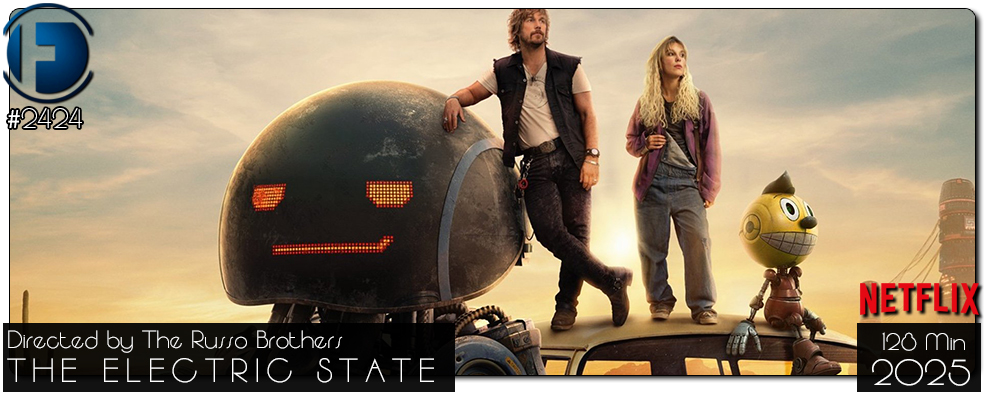Movie Review – Electric State, The
Principal Cast : Millie Bobby Brown, Chris Pratt, Ke Huy Quan, Stanley Tucci, Woody Norman, Giancarlo Esposito, Jason Alexander, Martin Klebba, Marin Hinkle, Michael Strucco, Woody Harrelson, Anthony Mackie, Brian Cox, Jenny Slate, Alan Tudyk, Hank Azaria, Colman Domingo, Rob Gronkowski, Billy Gardell, Susan Leslie, Jordan Black.
Synopsis: An orphaned teen hits the road with a mysterious robot to find her long-lost brother, teaming up with a smuggler and his wisecracking sidekick.
********
Despite glowing reviews and record-smashing box office returns with their Marvel Cinematic Universe entries—including two of the highest-grossing films of all time, Avengers: Endgame and Avengers: Infinity War—director siblings Anthony and Joe Russo have had a fairly middling career since stepping out from under the protective wing of Kevin Feige’s producorial powers. Following Endgame, the Russos downsized their ambitions with the dramatic thriller Cherry, starring then-current Spider-Man actor Tom Holland, for Netflix. They later re-teamed with the streamer and Captain America star Chris Evans for the exorbitantly expensive The Gray Man, a film that failed to capture either critical or general audience appeal, landing as a significant misfire in almost every market. Given their recent spotty track record, it’s baffling that Netflix would double down on the Russos, shelling out even more money to bring Simon Stålenhag’s 2017 graphic novel “The Electric State” to the screen. And yet, here we are. Reportedly costing $300 million—a significant portion of which was likely sunk into pre-Russo rights and development—the film is a visually polished, well-mounted riff on classic ‘80s fantasy adventure fare, evoking the likes of Spielberg, Zemeckis, and Jim Henson. With a solid cast and a heavy dose of rejiggered needle-drop classics, it certainly looks the part.
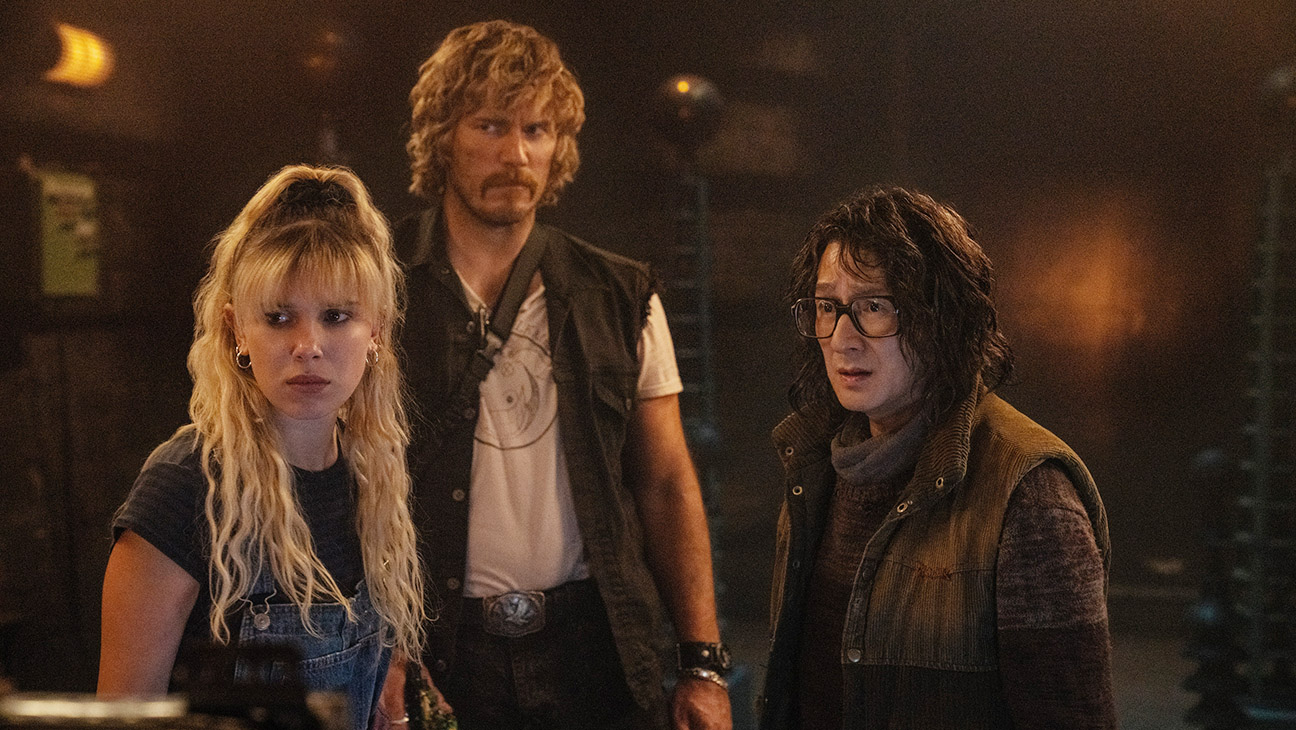
This, however, does not a great film make. The Electric State suffers from a frustrating disconnect between the characters on-screen and the audience watching, though not for lack of effort. Set in an alternate past with a vaguely steampunk sensibility, the story follows young Michelle Greene (Millie Bobby Brown, Damsel), whose brother, Chris (Woody Norman, Cobweb), is abducted by the sinister Sentre Corporation following a devastating war between humans and robots. CEO and chief scientist Ethan Skate (Stanley Tucci, Conclave) has enslaved humanity through his ubiquitous Neurocasters—devices allowing people to escape reality by living in an online fantasy world. Think The Matrix meets WALL-E. When Michelle learns of her brother’s fate, she embarks on a perilous journey to rescue him, accompanied by roguish drifter John Keats (Chris Pratt, Guardians of the Galaxy) and his robotic sidekick Herm (voiced by Anthony Mackie, Outside The Wire). Their quest leads them to a mysterious exclusion zone, a dumping ground for surviving robots, where they encounter the enigmatic Dr Clark Amherst (Oscar-winner Ke Huy Quan, Everything Everywhere All At Once) and the de facto leader of the exiled machines, Mr Peanut (voiced by Woody Harrelson), both of whom have their own ties to Sentre’s nefarious plans.
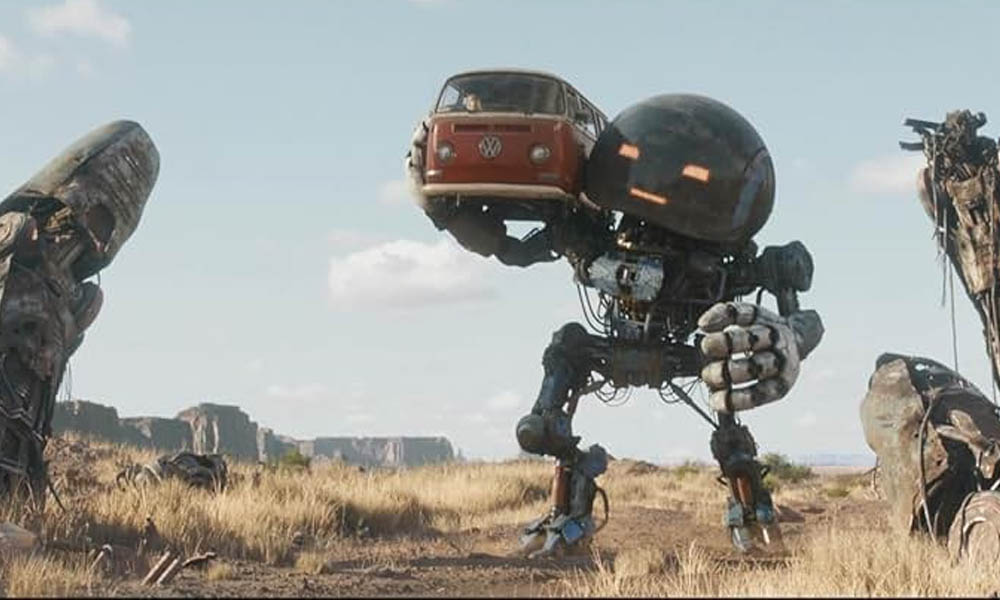
With a producer list as long as your arm—boasting no fewer than twelve executive producers, including The Flash director Andy Muschietti, who was originally attached to the project before Stålenhag’s book was even published—you’d expect the film’s pedigree to be exceptional. And in some ways, it is. Visually, it’s an expensive-looking movie, with all the right names behind the camera. The adapted screenplay, penned by the Russos’ longtime MCU collaborators Christopher Markus and Stephen McFeely, somehow strips the source material of its emotional depth, reducing it to pedestrian lip service—reminiscent of Bicentennial Man’s sentimentality. In many respects, The Electric State exists in the same narrative space as Spielberg’s A.I. Artificial Intelligence or Alex Proyas’ dystopian I, Robot, with traces of Robert Rodriguez’s Alita: Battle Angel and Ridley Scott’s Blade Runner sprinkled in. But instead of diving into profound existential themes, it opts for a cartoonish sensibility, leaning heavily on its digitally rendered robotic denizens—many of whom are designed to be either endearingly cute or vaguely nostalgic for older audiences. The film hints at a deeper commentary on the relationship between machines and organic life but ultimately brushes these ideas aside in favour of CGI-laden set pieces and the dynamic between Brown and Pratt. Unfortunately, this is where things fall apart. Millie Bobby Brown, usually a compelling screen presence, delivers an oddly lifeless performance, utterly devoid of charisma. Meanwhile, Pratt does what Pratt always does—playing yet another variation of himself.
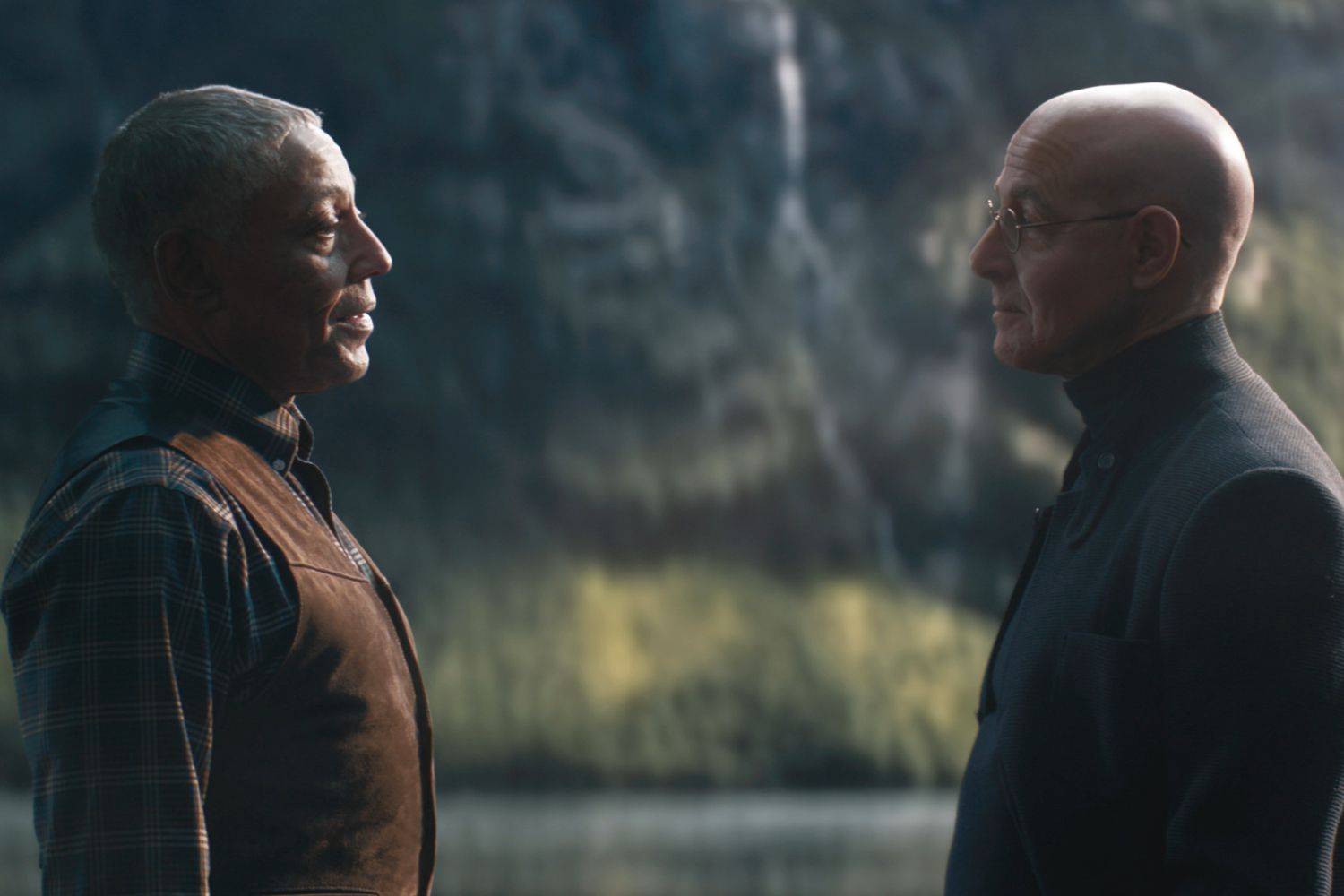
Characterisation across the board is weak. Tucci’s villainous Ethan Skate is a teeth-gnashing caricature, with no real menace or intrigue to back up his role as the film’s antagonist. Giancarlo Esposito’s robotic mercenary, Marshall Bradbury—nicknamed “The Butcher of Schenectady”—is never given a meaningful backstory to justify the moniker. Ke Huy Quan, fresh off an Oscar win, struggles to find relevance in what amounts to little more than an extended cameo. The robotic characters, though voiced by recognisable names, feel like little more than stunt casting. Woody Harrelson’s Mr Peanut, Mackie’s fast-talking Herm, and Brian Cox’s baseball-mascot-turned-brawler exist purely as gimmicks rather than well-developed characters. Despite the film’s astronomical budget, the end result feels surprisingly hollow.

And yet—here’s where I diverge from the critical consensus—I actually had a good time with The Electric State. It’s not a masterpiece, nor did it need to cost this much, but it’s far from the disaster some have proclaimed it to be. While the film has been criticised for straying in both tone and narrative from its source material, I can’t comment on those differences, having not read the book. What I can say is that I enjoyed the film on its own merits. The decision to set the story in an alternate late ‘90s, complete with an anachronistic tech aesthetic, resonated with me. The Russo brothers’ visual storytelling style, which has sometimes felt out of place in their post-MCU work, actually suits this world. Yes, the film has pacing issues, an over-reliance on CGI over practical effects, and a villainous plot that lacks depth, but I still found myself engaged. It could have said more about humanity’s relationship with technology, but at the very least, it’s fun. The deus ex machina climax reminded me a little too much of The Mitchells vs. the Machines, but overall, The Electric State is nowhere near the trainwreck mainstream critics have suggested.
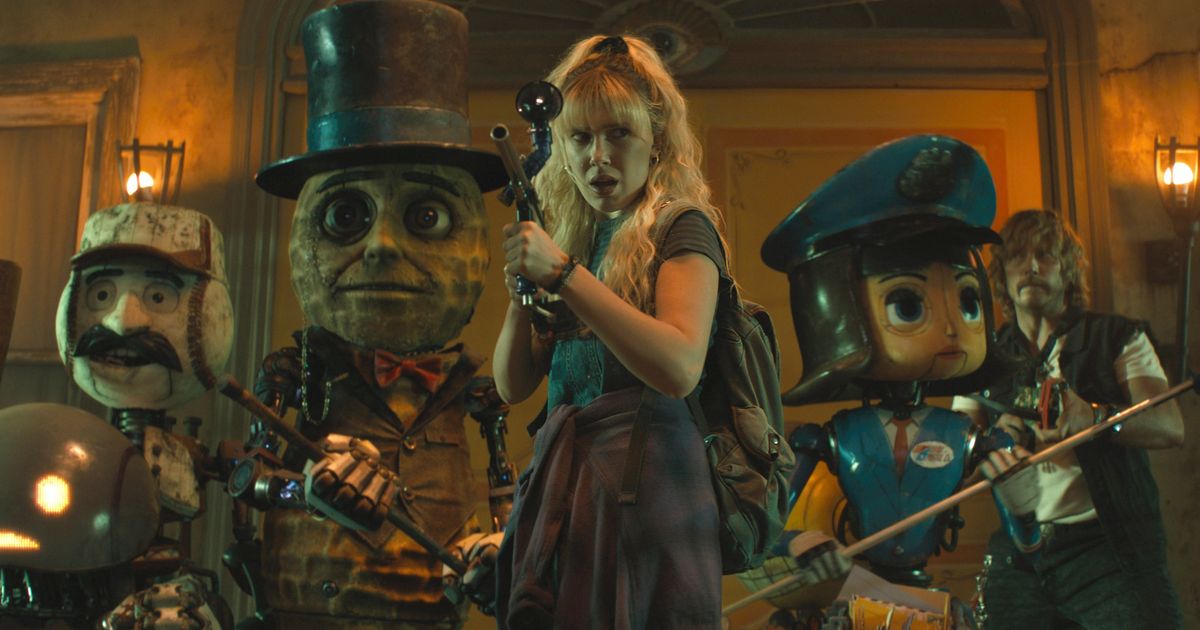
The film’s heavy use of pop music—a technique I usually find irritating when attempted by anyone other than Tarantino—actually worked in its favour, enhancing its nostalgic charm. The action sequences are bombastic (oh, how I wish I’d seen this on a cinema screen), the editing is competent, and Alan Silvestri’s score, while effective, is hardly memorable. However, at two hours and change, the film is at least twenty minutes too long. Had it been a tight ninety-minute adventure, with fewer meandering side quests and a sharper emotional throughline, it could have been a far stronger experience.
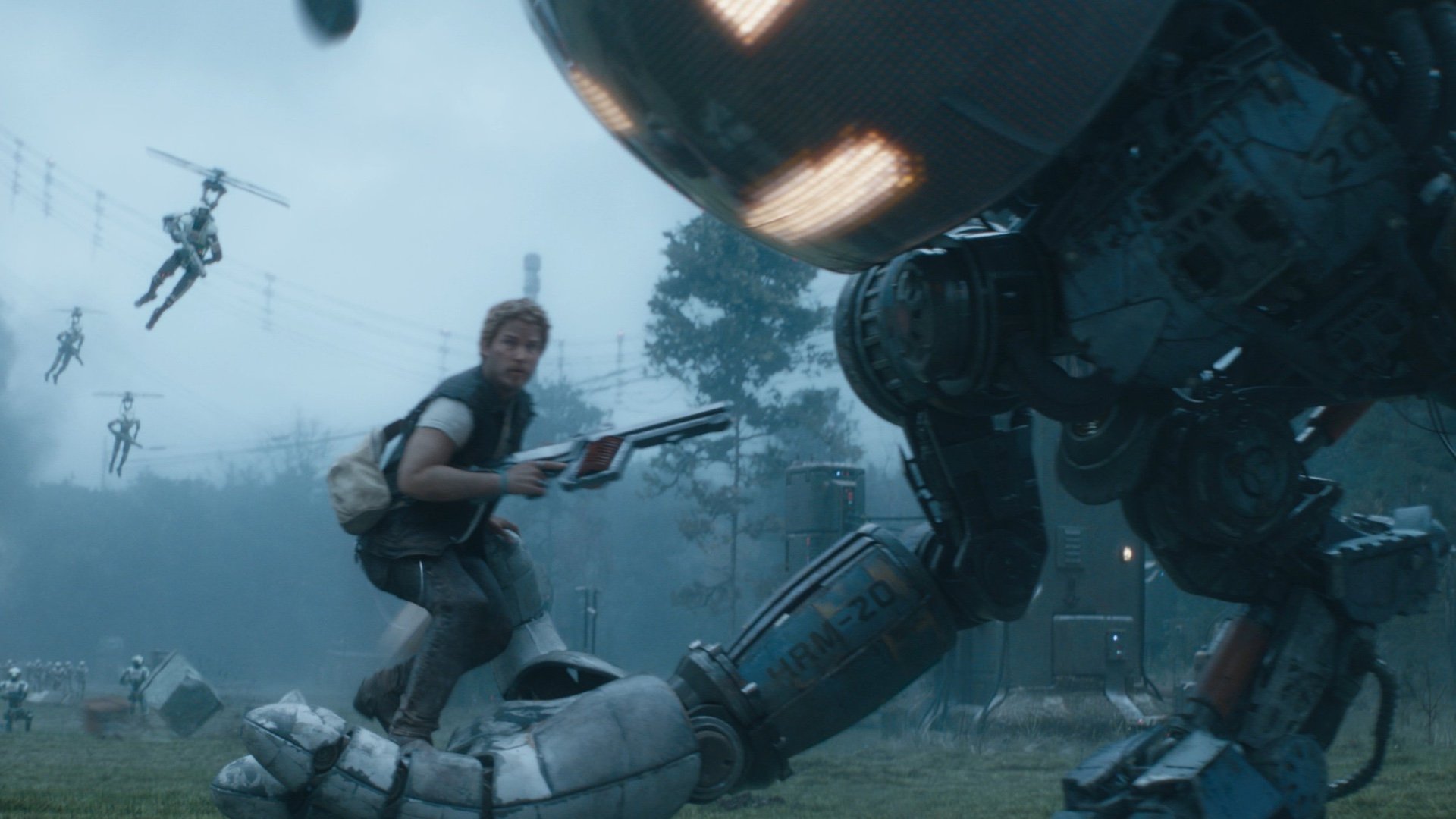
Ultimately, The Electric State is a serviceable, undemanding homage to the symbiosis of man and machine—dabbling in sci-fi and fantasy without ever striking gold. It’s entertaining, predictable, and a little too familiar for its own good. Pratt and Brown are undermined by uninspired writing, while the audience is left yearning for an emotional connection that never quite materialises. Yet, despite its flaws, it’s not the unmitigated failure some claim. A one-time watch? Absolutely. A classic? Hardly. The biggest problem? It reminds me of too many other films that did the same thing—only better.

